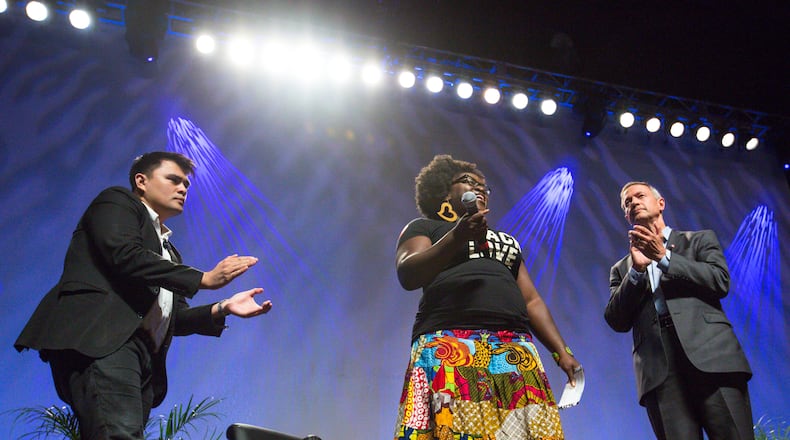Democratic presidential candidate Martin O'Malley on Saturday joined a list of candidates who have, intentionally or unintentionally, said three words igniting both boos and jeers: "All lives matter."
At the Netroots Nation convention in Phoenix, Ariz., an annual gathering of political activists, protesters marched toward the stage and confronted presidential candidates O'Malley and Bernie Sanders, demanding policy proposals for African-Americans who have specifically died in police custody.
In an attempt to respond to the protesters' concerns, O'Malley said, "Black lives matter. White lives matter. All lives matter." The crowd erupted in loud boos.
Activists, like some at Saturday's conference, interpret the "all lives matter" response as minimizing the importance of blacks killed by police, citing the disproportionate frequency of black American deaths by the police force.
The often misunderstood, angered response from #BlackLivesMatter activists comes, they say, from the deeply-rooted feeling that police often disregard black lives.
O'Malley reiterated that he meant no disrespect after the conference — but this isn't the first time a presidential candidate received backlash for saying "all lives matter."
Last month, Hillary Clinton gave a speech at a historic black church in Missouri after the Charleston, S.C., shooting. While the speech was mostly well-received, she also said "all lives matter," angering several activists.
On Monday, Clinton held a Facebook Q&A and was asked what she would have said to the same protesters her opponents faced Saturday.
In something of a do-over of last month's mishap, she said: "Black lives matter. Everyone in this country should stand firmly behind that."
The phrase #AllLivesMatter originated as a response to #BlackLivesMatter, a movement that first began after George Zimmerman was found not guilty in 2012 in the shooting death of Trayvon Martin.
Judith Butler, a philosopher at the University of California, Berkeley explained that when people respond to #BlackLivesMatter with #AllLivesMatter, they misinterpret the problem. But that doesn’t necessarily mean their message is untrue.
In an interview with the New York Times, Butler said, "It is true that all lives matter, but it is equally true that not all lives are understood to matter, which is precisely why it is most important to name the lives that have not mattered, and are struggling to matter in the way they deserve."
To many activists, black lives fall under that big umbrella — the lives that have not, but are struggling, to matter.
Actor Matt McGorry, of "Orange is the New Black" and "How to Get Away With Murder," wrote a string of tweets in response to the situation. He wrote that while some may feel that saying #AllLivesMatter in response to #BlackLivesMatter feels more inclusive, it ultimately undermines the specific purpose of the movement.
The recent use of the phrase "all lives matter" by O'Malley incited a new round of the same debates, which have been around since #BlackLivesMatter and #AllLivesMatter first started trending in 2012.
But pundits say if Democratic presidential candidates like Sanders and O'Malley, who vocally advocate police reform or like Clinton, who has made speeches about her vision for changes to the criminal justice system, want to connect with black voters — a key Democratic constituency — they must recognize the message behind a movement like #BlackLivesMatter is critical.
About the Author
Keep Reading
The Latest
Featured




